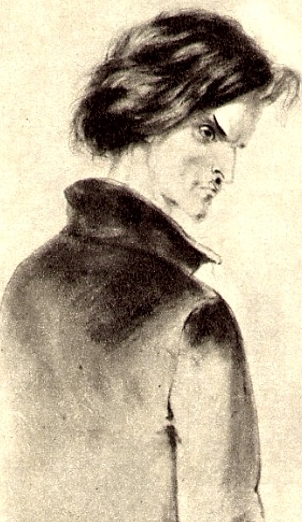
Fyodor Dostoyevsky’s Crime and Punishment explores complex psychological and sociological themes such as morality, socialism, and the effects of isolation. The story begins in St. Petersburg, Russia, during the 1860s. The plotline follows a clever ex-student, Raskolnikov, through the intimate psychological journey of his decision to step over the law and commit murder. He explores his beliefs about self and society, following his own dangerous thought patterns to test the limits of morality. Raskolnikov allows himself to become deeply alienated as he develops transcendent ideals. This dangerous symbiotic relationship between isolation and immorality is only healed through the act of confession.
Isolation
In his article, “On Crime,” Raskolnikov’s transcendental view of self is explored. Written during his time as a student and released in the local paper, Raskolnikov argues for the existence of an extraordinary person that can step over the line of the law. He admits his belief that a person often commits crime for the purpose of bringing about a better reality. Following this logic, if a person with extraordinary views comes along, it is permissible for them to step over the law – going as far as murder in order to better society:
“If such a person finds it necessary, for the sake of his idea, to step over a dead body, over a pool of blood, then he is able within his own conscious to give himself permission to do so.” (Dostoyevsky 310)
Raskolnikov’s view of personhood becomes severely damaged because of this idealism. The thought that he could be this ‘extraordinary person’ consumes his mind and he begins to view himself as superior to others, seeing people as mere “parasites” (pg. 497). This thought causes him to gradually begin retracting from society, as he sees no value in sharing his life with others. He stops studying, quits his job, and does not pay his rent.
This retraction from society quickly escalates into a tormenting physical and mental isolation for Raskolnikov. Isolation itself does not always cause hatred or disconnection but does guarantee the magnification of internal thoughts. Raskolnikov retreats to his room – a tiny, cramped, attic apartment. Here, he commits himself to nothing but the work of “thinking,” allowing for the intensification of his negative thoughts (Dostoyevsky 37). He describes this room as his “coffin” or “cell” – powerful imagery reflecting the constricting and deadly effects of physical isolation on his mental state. Dostoyevsky comments on this in part one, chapter three, saying:
“He had withdrawn from everyone, like a tortoise into its shell, and even the face of the maidservant whose task it was to wait upon him and who sometimes peeped into his room irritated him to the point of bile and convulsions.” (Dostoyevsky 37)
His isolation from humanity causes a physical repulsion to the presence of other people. His body is so accustomed to isolation that it rejects the presence of other humans.
Mentally, Raskolnikov is in a similar place. In part 3, chapter 1, he wakes up in a mental fog to find himself surrounded by his closest friends and family. If anyone outside of himself has the ability to break him free from his isolation and heal his view of personhood, it would be his mother, sister, and close friend Razumikhin. Yet as they offer to nurse him back to health, he rejects their kind gestures, saying: “I can’t with this, I really can’t! Stop Harassing me! That’s enough, now, go away … I can’t cope with it (pg. 236).” His reaction to their emotional intimacy reveals his destructive mental isolation, even though it does not push him to physical convulsions. This mental distance, combined with his physical isolation, results in complete separation from other people. His previous ideals of superiority being brought to an extreme through isolation cause him to become disgusted by other humans. His view of humanity reaches rock bottom while his curiosity about self is at an all-time high, causing his morale to become unstable enough to commit the crime.
Confession
To redeem himself, it is essential that Raskolnikov confess his crime to another person – exiting his isolation and acknowledging that the companionship of another human is valuable. This path towards redemption becomes apparent to Raskolnikov as he contemplates his future under the burden of his secret. As he tells his mother he is eager to have an honest conversation with her, reality hits:
“He had just told a horrible lie, that not only now would there not be time for him to have a good talk – it was now out of the question for him to speak to anyone about anything ever again.” (Dostoyevsky 273)
In a pivotal moment, Raskolnikov must confront a universally human difficulty. He must choose between sharing the truth of his wrongdoing and facing punishment or living in alienation – unable to ever have an honest conversation again. Raskolnikov decides to make his confession, singling out Sonya as the one he must confess to.
Upon his confession, Raskolnikov’s heart immediately emerges from its repugnant isolation. As he shares his burden with Sonya, she expresses compassion, falling at his feet. This tender moment of connection briefly relieves the weight of his sin and sparks healing in his heart. Dostoyevsky comments: “A sensation he had not experienced for a long time came flooding into his soul like a wave and instantly softened it. He did not resist the sensation: two tears rolled from his eyes and hung on his lashes (Dostoyevsky 491).” This emotional response is exceptionally different from the reaction he displayed toward his family’s attempt at connection – proving that confession is indeed the primary means of his restoration.
Once Raskolnikov completes his confession to the rest of the world, he is able to process what has happened and begin healing. Raskolnikov bows down in the marketplace – an act signifying his confession to the world, and turns himself in to the police. His past crimes send him to Siberia where he wrestles with his previous ideals of superiority, working through feelings of resentment, disappointment, and cowardice. He begins to recognize his place in the world as he notices the way he relates to the other prisoners. As his sense of morality heals, “many things began to fill him with wonder, and almost in spite of himself he began to observe things that before he had not suspected (Dostoyevsky 650).” The narrative ends as he falls on his knees, confessing his love to Sonya. This moment is not intended to reframe the book into one of romance but instead demonstrates Raskolnikov’s redemption. He has transitioned from someone who overvalues himself and loathes other people to someone who can fall in humility at the mercy of another person.
In summary, Raskolnikov’s ideals about the existence of an extraordinary person infected his character, causing him to draw away from society as he lost sight of another person’s value. Isolation intensified his thoughts as he grew physically and mentally accustomed to alienation and solitude. This toxic isolation, combined with his self-idealization, causes him to commit the crime. Confession is essential to redemption, as proved through his confession to Sonya, which sparks his healing. Although the story does not reveal Raskolnikov’s end, it concludes with his vulnerable confession of love to Sonya, giving readers hope for his complete restoration.
Eden
Readers are compelled by Dostoyevsky’s skillful writing to consider following the Christ-like virtue of truth through pursuing confession. Taking his subtle advice communicated through plotline and character, one is able to recognize themselves amid the trenches of alienation, regret, and pride and follow this simple path towards redemption and freedom. A theme explored by poet, philosopher, psychologist, and theologian alike, confession itself has been woven into the order of the universe since the Garden of Eden as a means of restoring relationships and allowing healing. As illustrated in Crime and Punishment, man eagerly desires to be in good, true relationship. God has beautifully created a way for this to happen and has mercifully allowed us to practice it with himself. Man can be satisfied, as the weight of isolation is lifted and the mind experiences freedom and healing, all through the age-old practice of confession.
Works Cited
Dostoyevsky, Fyodor. Crime and Punishment. Penguin Classics, 2003.











